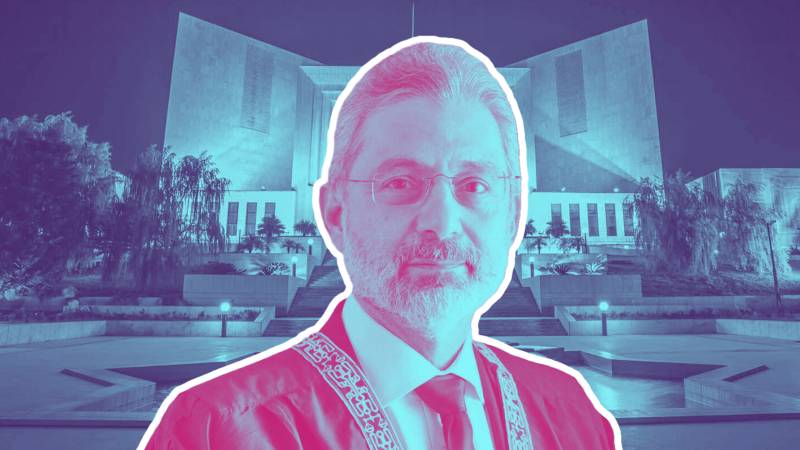
The Supreme Court has decided not to initiate contempt proceedings regarding the non-implementation of Faizabad Dharna's judgment. However, Chief Justice of Pakistan (CJP) Qazi Faiz Isa has acknowledged manipulation in the Supreme Court by not fixing the case for an early hearing.
"Those who were in government when the judgment was given are no longer in government, and the composition of the Election Commission of Pakistan (ECP) has also changed. Therefore, It would not be appropriate to hold the present incumbents responsible for the actions/inactions of their predecessors, particularly when they have demonstrated that they want to implement the decision of this court," observed Chief Justice Qazi Faez Isa in a four-page written order issued on Thursday in the Faizabad Dharna case.
The review petitions and applications were filed in early 2019 but were not fixed for several years. In the interim, the other signatory to the judgment, Justice Mushir Alam, retired on August 17, 2021.
Acknowledging the manipulation, the chief justice expressed his determination to not repeat past mistakes.
"It is long overdue that every institution acts transparently and responsibly. And when wrong is done, it is incumbent to acknowledge it. Ignoring wrongdoing or offering a bare denial of it when the facts suggest otherwise is to have lived a lie and perpetuated it; it is also against the interest of the public whose taxes fund all public institutions," he stated.
"With humility and setting an example for others to follow, this court acknowledges the manipulation resorted to in the Supreme Court by not fixing the said petitions and applications," observed Chief Justice Isa.
The order revealed how his predecessors gave no directions on fixing the review petitions for years despite the placement of the case in the proposed list.
The order noted that the review petition was added to the final cause list for the first time in April 2019. But it was removed from the cause list the same day on the directions of former Chief Justice Asif Saeed Khosa.
The written order noted that relevant officers in the top court were asked to submit the report on failing to fix the case before a court. Subsequently, the Additional Registrar (Fixture) and the Additional Registrar (Judicial) jointly filed the report. The report, quoted in the written order, stated that previously important cases used to be fixed for hearing after approval from the former chief justices.
"Record shows that C.R.P.266/2019 etc., were added in draft of Final Cause List No.17/2019 for the first time on April 25, 2019, at 01:12 pm, however, the same were removed from the draft list on April 25, 2019, at 5:06 pm per directions given by the then Chief Justice (Asif Saeed Khosa)," the report stated.
"It is also worth mentioning that the said cases were also repeatedly mentioned in the list of important cases presented to former chief justices from time to time, however, these cases remained pending in office due to the reason that there were no direction from the then chief justices for fixation of the cases," the report stated.
"The Supreme Court endeavours to regain the confidence of the people by acknowledging this and will be demonstrating that the mistakes of the past will not be repeated. Truth sets one free and makes institutions strong. The people of Pakistan deserve nothing less," observed the chief justice.
"Lack of trust in public institutions engenders autocracy and threatens democracy. If individuals begin to overshadow the institutions they work in, they cause irreparable harm, diminish their institution, and render them as their alter ego," he further observed.
“It should not need reminding that every decision of the Supreme Court is binding and must be implemented by all executive authorities as stipulated in Articles 189 and 190 of the Constitution.”
“Implementation, however, may be forestalled when review petitions and other applications are pending. However, all review petitions and applications have now been disposed of.”
May 9 incidents
The written order also pointed to the incident of May 9, wherein Pakistan Tehreek-e-Insaf (PTI) workers staged demonstrations and vandalised army installations.
The order stated that February 6, 2019, judgment on Faizabad Dharna traced the history of orchestrated violent protests in Pakistan and sounded a warning for the future.
However, the concerns expressed by the court almost five years ago were disregarded by successive governments, the court noted, adding that review petitions and applications were filed, and these were not fixed for hearing, which hindered the judgment’s implementation.
"No responsibility was affixed, nor was anyone held accountable for the violence of the past. It is not surprising that violence continued to be perceived as a permissible means to attain one’s goals."
"Victims of those striving for an independent judiciary, an inclusive and tolerant Pakistan were disregarded without justice; the nation suffered the consequences, as evident from the recent events of May 9, 2023."

